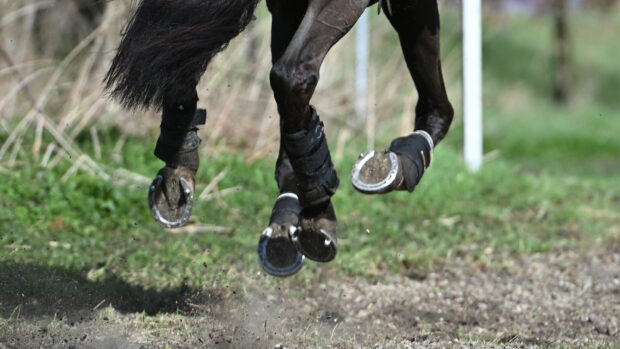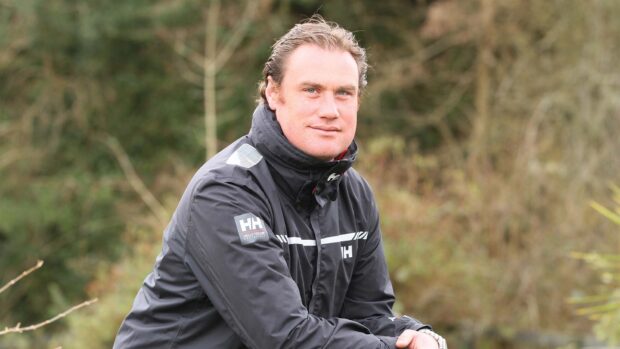Welcoming a newborn into the family is a major life change and it’s not uncommon to feel an impact on your riding confidence after having a baby – whether you’re mum or dad. But why can this happen?
“So much changes for a new parent,” says sports psychologist and equestrian confidence coach Alex Fleming, founder of Coaching 4 Confidence. “There are mindset changes, physical changes and parents can feel pressure in their new role from all areas, be that from other family members, societal expectations, or even themselves.”
Alex, a mum of two boys who loves to event, says her own relationship with riding was affected by becoming a parent.
“I felt like I rushed out and tried to prove to myself that I could still do the same stuff with my horse, Fonz. We were working towards stepping up to novice, so I got back out and entered an event very quickly. I got a babysitter for the day and remember driving to the venue exhausted and in tears. I thought ‘who are you trying to prove this to?’ The answer was: myself.”
Alex “backed off” competing for a few months, and riding became more enjoyable again. Her second son was born in February 2025, and she’s planning a more relaxed approach this time.
“It’s very easy to put that pressure on yourself, but I’ll do things differently this time,” she says. “I have an ex-racehorse, who’s coming back from medical issues. He’s ready to start long-reining, so we’ll get fit together.”
Feeling pressured to prove yourself is just one possible effect on your riding confidence after having a baby. As Alex explains, a lot is going on for new parents who ride – let’s look at some of the challenges of parenthood as a rider in more detail.
Riding confidence after having a baby: changes in the brain
“A scan of your brain before becoming a parent is completely different from a scan after the baby arrives,” says Alex. “You’re experiencing hormonal changes, you’re probably sleep deprived, and all this feeds in how you might be feeling about riding as a new parent.”
According to Alex, hormonal changes and lack of sleep help activate the brain’s stress centres, and this can have a huge impact on how we feel about riding.
“In very simple terms, and using Professor Steven Peters’ easy-to-understand model, you have a chimp part of your brain, which is like the emotional side, and the human, rational-thinking side. Your decisions, and thus your actions, originate from one side or the other.
“Primitive needs activate the chimp part of the brain, such as hunger or tiredness. If you’re running on too little sleep, the chimp side is triggered and you’re operating in a state of high alert.”
Alex explains that being in this state of fight-or-flight can reduce a new parent’s capacity to manage even ordinary situations in their lives, let alone a horse.
“It’s literally like that old Snickers advert: ‘you’re not you when you’re hungry’,” she continues. “Something that wouldn’t have triggered an emotional response ordinarily might suddenly set you off much more easily. For example, you might never have thought twice about your horse napping or spooking before, but suddenly find yourself in tears.
“It’s important to remember there’s absolutely nothing wrong with you for feeling this way, it’s just your capacity to deal with day-to-day setbacks is significantly reduced.”
Identity crisis?
Lots of riders say spending time with their horses is therapeutic. But if you feel a dip in riding confidence after having a baby, it can upend how you feel about riding and caring for horses generally.
“I hear lots of hobby riders who are new mums or dads say they’ve lost the one thing that felt like their ‘me’ time,” explains Alex. “Suddenly, they’re beating themselves up – and the yard is never going to feel like a sanctuary if you berate yourself the whole time you’re there.”
Alex says becoming a parent presents a new normal, and that new normal extends to your life as a horse owner.
“The time constraints with young children are massive and maintaining your riding or competing routine from before becoming a parent is far from easy.
“I love eventing, but I also love spending time with my family. One change I made with my first son was competing in showjumping for a while because it was more time-efficient. That doesn’t take away who I am as a rider. It’s just a new thing I want to focus on.”
Alex urges new parents to treat themselves with kindness, and while your riding life might look different for a time, it doesn’t mean forever.
“It’s about using the time with your horse without any pressure to make yourself feel good. For now, that might be grooming your horse, hacking with your best friend or handwalking. Giving yourself grace helps curb negative self-talk.”
Harsh self-criticism can be a symptom of post-natal depression, as well as anxiety and low mood.
“But even without that, it’s very easy to go down a negative self-talk spiral where you undermine your own ability and dwell on worst-case scenarios,” says Alex. “Negative self-talk undermines your confidence, so nipping it in the bud will help you get back to where you want to be more easily.
“Any new parent with symptoms of post-natal depression can contact their GP as their first port of call.”
The weight of expectation
Alex says family dynamics can affect riding confidence after having a baby.
“If your family isn’t horsey, they don’t always understand how all-encompassing being a rider or owner can be,” she says. “It’s a passion, but it comes with serious time constraints. In some cases, families think new parents should forgo their hobby for a while, and if family members make that idea quite obvious, that can feed into your confidence.”
On the other hand, expectations in an equestrian family may be reversed.
“I had a client from a strong hunting background, and her family’s attitude is very much ‘get back on the horse; it’s what you do’. It’s interesting because there’s been no expectation that her riding should dwindle.”
Is confidence affected depending on whether you’re a new mum or a new dad?
“I’ve worked with fewer dads than mums, so it is somewhat biased,” says Alex. “But I think because of different societal pressures, it is more expected that a new dad would continue to pursue a hobby, so it’s easier to keep going without too much changing.”
Find your new normal
Alex says keeping her inner voice kind and positive helps her the most. “I say this mantra to myself: I want to be a role model who enjoys their hobbies. I’d like my sons to do that for themselves, so the best way to help them believe it is to showcase it.
“I’ve worked very hard on managing my inner voice, and filtering everyone else’s out – it’s about what I want for myself, not what others want me to do.”
Find out more about Alex’s work at coaching4confidence.co.uk
- To stay up to date with all the breaking news from major shows throughout 2025, subscribe to the Horse & Hound website
You may also be interested in:

Can horses help reduce anxiety? Yes – plus four other ways riding benefits mental health

Scared after falling off a horse? A confidence coach explains why this might happen

Why do you lack confidence when riding or handling horses? Five questions to ask yourself

Subscribe to Horse & Hound magazine today – and enjoy unlimited website access all year round




